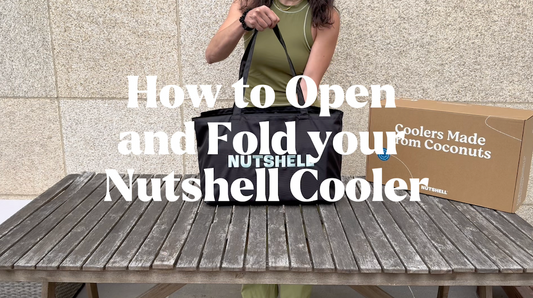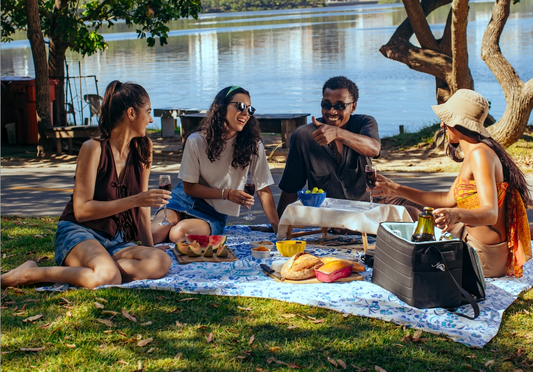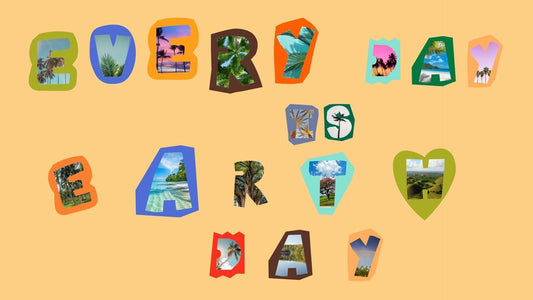Why buy a $250 Nutshell when you can get a big blue plastic cooler at the hardware store for $50?
We get this question all the time.
I used to be defensive about it. Why buy a $2,000 bicycle, a $100 sweater, a $5 cup of coffee, when lots of cheaper options exist?
Well, that $5 coffee probably tastes better than the $1 styrofoam cup at the gas station. Maybe it benefits a farming cooperative in Guatemala, or you like the other people who hang out at the cafe, or you just like to support a local business? There are lots of good reasons!
But I quickly realized that starting a company means building this trust from scratch--we have to demonstrate our quality, show our impact, and explain exactly where your money actually goes. As a new brand, we need to work even harder to earn a single dollar from a customer, much less $250. So now I’m happy when people ask because it's a chance for us to start this conversation.
I hope the quality and the impact is clear from looking around our website and reading reviews from other customers. As for the price tag, here’s exactly what your money buys:
Labor: $10
It takes about 40 people to turn a pile of leftover coconut husks into a Nutshell Cooler.
There are the farmers, who separate the husk from the shell. The knitters, who knit the husk into insulation panels. And the sewers, who turn the flat panels into a high-performance cooler.
Believe it or not, we know every single farmer, knitter, and sewer in our supply chain. We know many of their families, neighbors, and pastors. We obsess over salaries and piece rates because we know exactly what these jobs mean to our friends in Camalig and Olongapo. We’re proud that Nutshell could support hundreds of families through the darkest COVID lockdowns and the joyous factory buildouts, and you should be too.
Materials: $40
This includes 37 upcycled coconut husks, 5 yards of recycled fabric, and 3 yards of recycled webbing, plus a bunch of snaps, hooks, and thread.
We pay a small premium to ensure that our fabric is made from verifiably recycled polyester. We pay a little extra for the husks so that we can support small-scale farmers instead of giant coconut oil mills. And we try to find the best hardware and components so that every part of the Nutshell will last for years. It’s hard to imagine compromising on any of these decisions.
Shipping and Tariffs: $60
Moving things around the Philippines is surprisingly expensive, as these beautiful islands require lots of ferries, and terrible traffic makes the long trips even longer. International freight prices have come down from their COVID peak, but shipping a container from the Philippines to Los Angeles is still triple what it was three years ago. Our warehouse in Salt Lake City is pretty well centralized, but US mail rates keep on rising. And we pay a 7% import duty from the Philippines.
(Believe it or not, all this transportation constitutes less than 10% of our carbon footprint. That’s because we choose sea freight over air at every possible step, and our soft-sided cooler collapses in transit so the shipping volume shrinks by half.)
Marketing and Distribution: $40
How do we find customers? Best case, our customers find us through word of mouth, a well-placed newspaper article, or an enticing glimpse at the Ballard Farmer’s Market last weekend.
But we also build our community through paid ads and promoted posts on social media. As much as we try to own our own distribution with community meetups and direct email communication, the big social media companies are the imperious gatekeepers of our age, and they don’t make it easy for small brands to reach anyone (even those of you who opt-in to following our pages!).
Plus a 3% credit card fee on every sale.
Everything Else: $20 - $100
This is how we finance our machinery, research our natural materials, design our products, and eventually pay ourselves. We did get some help from funders like the Asian Development Bank to start up and we’ll continue seeking grants as we scale. But while most cooler companies (and customers) can ride the coattails of the many factories already making plastic foam insulation and the thousands of engineers improving polymer performance, we have to build the natural fiber insulation capacity and expertise from scratch.
**Bonus** Sales Tax: $0! (Unless you live in New York)
You might just think of this as a limited-time $20 discount. Most states don't require businesses to collect sales tax themselves until they reach about $100,000 of sales in that state, so you will be charged $0 of tax unless you happen to live in New York. Technically, this means you non-New Yorkers have to track and pay sales tax yourself! Let’s just say that I won’t judge your moral fiber based on your decision here.
As we grow, some of these numbers will change, and we'll continue to share our decision-making around pricing and process.
As usual, we'd love to hear what you think about this too, so talk to us in the comments!



